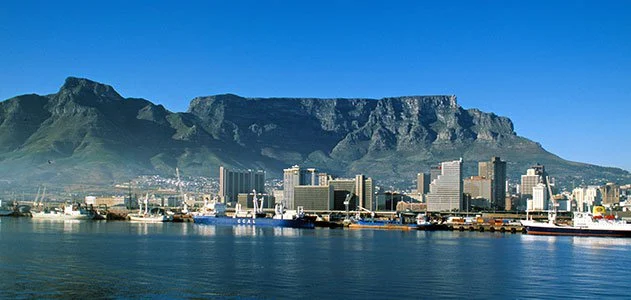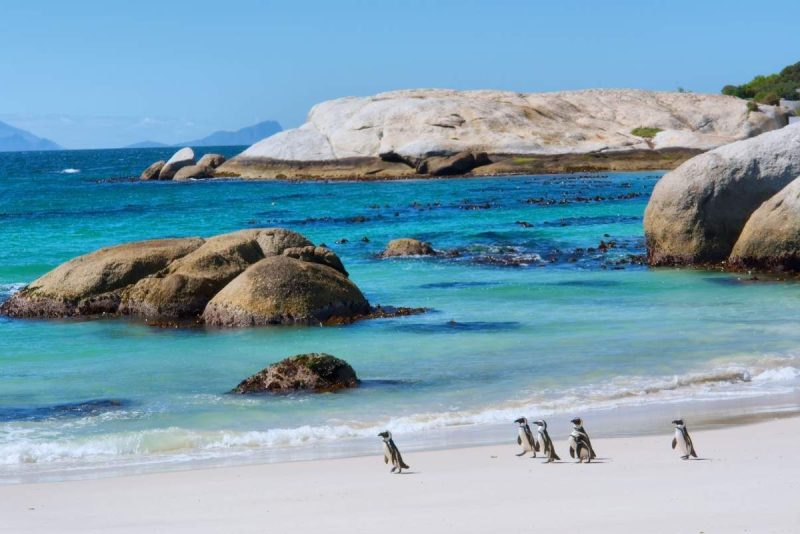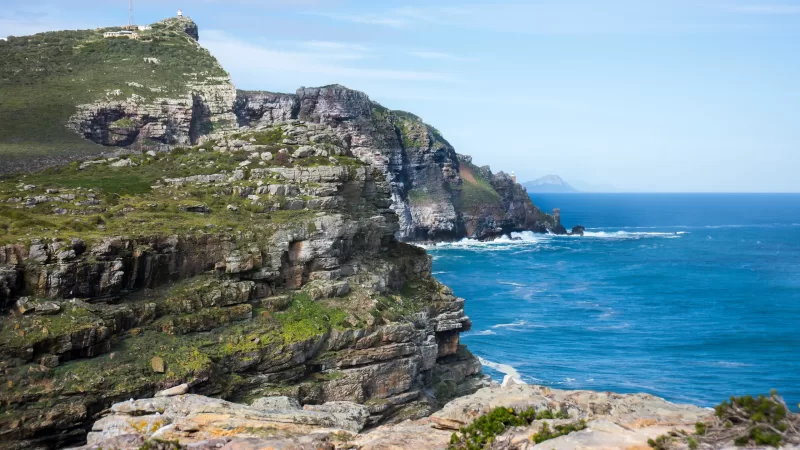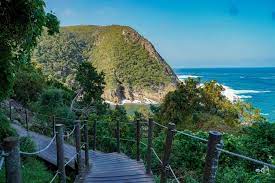SOUTH AFRICA
Enchanting South Africa is a captivating destination that will mesmerise you with its diverse landscapes, vibrant cultures, and abundant wildlife.
South Africa is a land of stunning natural beauty, where majestic mountains, pristine beaches, and vast savannahs coexist harmoniously. In the coastal city of Cape Town, you’ll be greeted by the iconic Table Mountain, a towering landmark that offers panoramic views of the city and the sparkling Atlantic Ocean. Explore the picturesque Cape Peninsula, where the dramatic cliffs of the Cape of Good Hope meet the crashing waves of the sea.
No visit to South Africa is complete without indulging in its world-renowned wine regions. Journey to the picturesque vineyards of Stellenbosch and Franschhoek where you can sample exquisite wines, savour gourmet cuisine, and soak in the beautiful landscapes of rolling vine-covered hills.
Venture eastward to the famous Garden Route, a stretch of coastline renowned for its breath-taking scenery. Immerse yourself in the lush forests, tranquil lagoons, and charming coastal towns that dot this remarkable region. Discover the Tsitsikamma National Park, a haven for outdoor enthusiasts, with its thrilling hiking trails and the world’s highest commercial bungee jump.
For an unforgettable wildlife experience, head to Kruger National Park, one of Africa’s premier safari destinations. Embark on an exhilarating game drive and witness the “Big Five” (lion, leopard, elephant, rhino, and buffalo) in their natural habitat. The park is a sanctuary for an incredible array of wildlife, from graceful giraffes to playful zebras, providing you with a once-in-a-lifetime encounter with nature’s wonders.
Delve into South Africa’s rich cultural heritage by visiting its vibrant cities. Johannesburg, the economic powerhouse of the country, boasts a pulsating energy and a thriving arts scene. Explore the Apartheid Museum to gain insight into the nation’s tumultuous past and the heroic struggle for freedom. In Durban, you can experience the fascinating Zulu culture and relax on the stunning beaches along the warm Indian Ocean.
South Africa is also a paradise for adventure enthusiasts. Brave the roaring rapids of the mighty Orange River on a thrilling white-water rafting expedition, dive into the vibrant underwater world of Sodwana Bay, a pristine marine reserve teeming with colourful coral reefs and diverse marine life, or hike the dramatic Drakensburg Mountains.
As the sun sets on your South African adventure, you’ll carry with you unforgettable memories of its breath-taking landscapes, warm-hearted people, and extraordinary wildlife. From the vibrant city life to the untamed wilderness, South Africa is a destination that will capture your heart and leave an indelible mark on your soul.
Source: ChatGPT
Explore the World: Follow These Top South African Tourism Instagram Accounts
A Very Brief History of South Africa
The political history of South Africa is marked by a complex and challenging struggle against racial segregation and oppression.
The political history of South Africa from 1600 to 1948 was characterised by colonialism, conflicts between European powers, the establishment of apartheid, and the growth of racial tensions.
In the 17th century, the Dutch East India Company established a colony at the Cape of Good Hope, leading to the influx of European settlers and the displacement of indigenous populations. The British took control of the Cape Colony in the early 19th century and implemented policies that marginalised the native African populations.
The discovery of diamonds and gold in the late 19th century intensified the colonisation process, leading to increased conflict between British colonial authorities, Dutch settlers (Boers), and African communities. The Boer Wars (1880-1881 and 1899-1902) between the British Empire and Boer republics further shaped the political landscape of the region.
In 1910, the Union of South Africa was established as a self-governing dominion within the British Empire, consolidating the political power of white minority rule. This period saw the introduction of racially discriminatory legislation, gradually laying the groundwork for the apartheid system.
The most notable chapter of this history is the era of apartheid, a system of institutionalised racial discrimination that was enforced by the National Party government from 1948 to 1994.
The National Party came to power in 1948, officially implementing apartheid as state policy. This system entrenched racial segregation, denying basic political rights and opportunities to non-white South Africans. The oppressive policies of apartheid led to widespread resistance, culminating in the eventual dismantling of apartheid in the 1990s and the birth of a democratic South Africa.
Under apartheid, South Africa’s non-white population, comprising the majority of the country, was subjected to a range of discriminatory laws and policies. These included forced removals, segregation of public facilities, and the denial of basic political rights. The African National Congress (ANC), along with other anti-apartheid organisations and individuals, led a resistance movement against the oppressive regime.
The struggle for freedom and equality gained momentum with significant events such as the Sharpeville Massacre in 1960, where peaceful protesters were shot by police, drawing international attention to the brutality of apartheid. In response to the growing resistance and pressure, the apartheid government faced widespread domestic and international condemnation, resulting in economic sanctions and diplomatic isolation.
A turning point came in the 1990s when the apartheid government, under President FW de Klerk, initiated negotiations with the ANC. These negotiations led to the dismantling of apartheid laws and the release of Nelson Mandela, who had been imprisoned for 27 years. In 1994, South Africa held its first democratic elections in which all citizens, regardless of race, were allowed to vote. Nelson Mandela was elected as the country’s first black president, marking the end of apartheid and the beginning of a new era of democracy in South Africa.
The political history of South Africa serves as a powerful reminder of the resilience of the human spirit and the triumph of justice over oppression. It is a story of struggle, sacrifice, and the relentless pursuit of equality, which continues to shape the country’s ongoing journey towards social cohesion and inclusivity.
South Africa Today
South Africa today is a dynamic and diverse country that has made significant progress since the end of apartheid in 1994. It is a constitutional democracy with a multi-party political system and regular elections. However, the country continues to face various challenges, including socioeconomic inequality, high unemployment rates, and persistent issues of crime and corruption.
One of the key achievements of post-apartheid South Africa has been the promotion of inclusivity and reconciliation. The Truth and Reconciliation Commission played a crucial role in addressing the crimes and human rights abuses of the apartheid era and facilitating a process of healing and forgiveness.
South Africa is known for its rich cultural diversity, with 11 official languages and a wide range of traditions and customs. It has a thriving arts and music scene, and its cultural heritage is celebrated through festivals, museums, and cultural events.
The country is also renowned for its natural beauty and wildlife. From the iconic Table Mountain in Cape Town to the breath-taking landscapes of Kruger National Park, South Africa offers a wide range of outdoor and adventure activities.
However, challenges such as poverty, inequality, and high crime rates persist, particularly affecting marginalised communities. Efforts are being made to address these issues through various social and economic development programs, including initiatives to improve education, healthcare, and infrastructure.
South Africa also faces environmental challenges, such as water scarcity and climate change impacts. Conservation efforts are being implemented to protect the country’s unique biodiversity and natural resources.
In recent years, South Africa has faced additional challenges, including the impact of the COVID-19 pandemic, which has put strains on the healthcare system and exacerbated existing socioeconomic inequalities.
Despite these challenges, South Africa remains a country with great potential and resilience. It continues to strive for social cohesion, economic growth, and sustainable development, while working towards a more equitable society for all its citizens.
Source: ChatGPT






